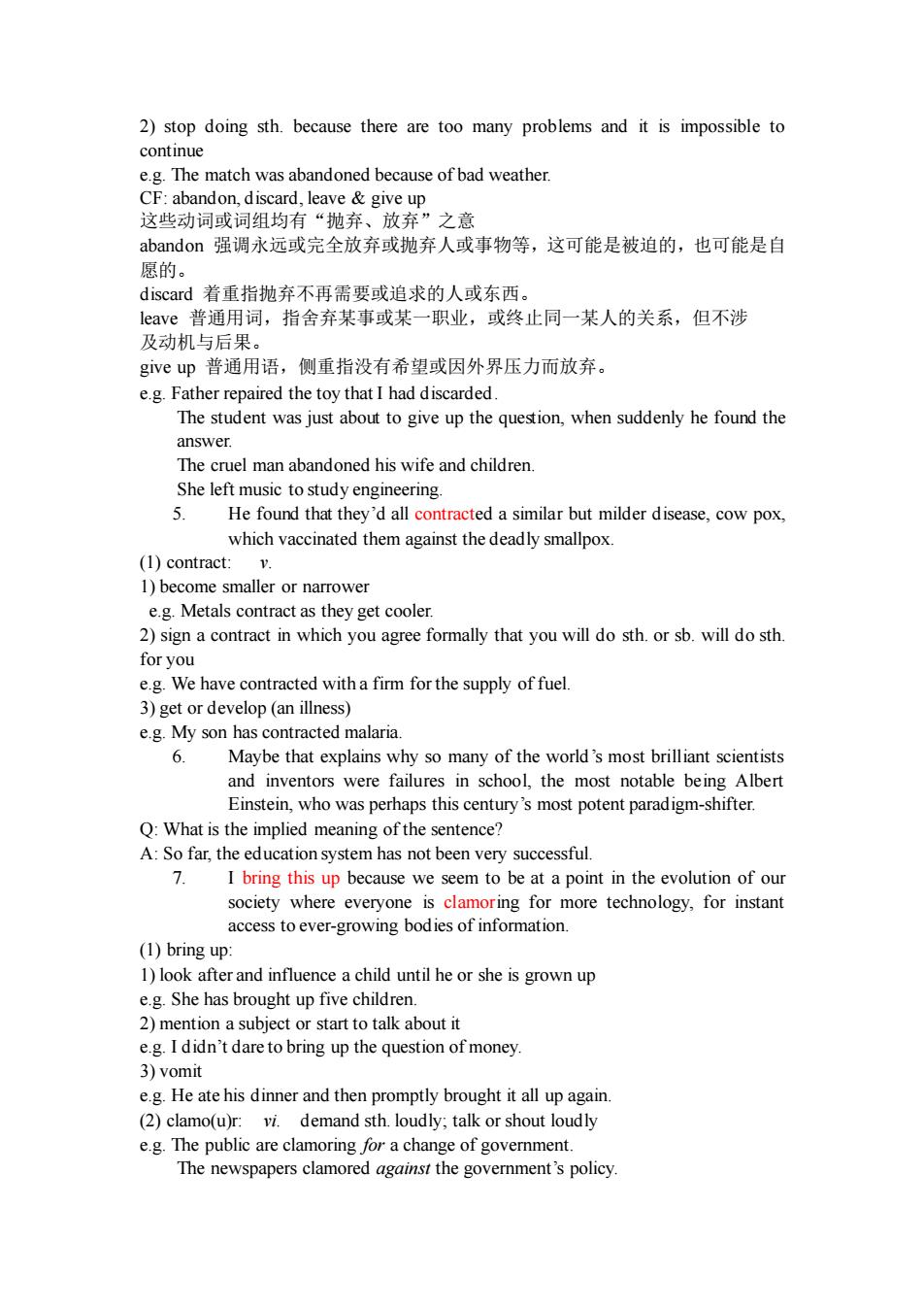正在加载图片...

2)stop doing sth.because there are too many problems and it is impossible to e.g.The match was abandoned because of bad weather CF:abandon,d scard,leave give up 这些动词或词组均有“抛弃、放弃”之意 abandon强调永远或完全放弃或抛弃人或事物等,这可能是被迫的,也可能是自 鬼的。 discard着重指抛弃不再需要或追求的人或东西 leave 普通用词,指舍弃某事或某一职业,或终止同一某人的关系,但不涉 及动机与后果。 give up普通用语,侧重指没有希望或因外界压力而放弃。 answe The cruel man abandoned his wife and children. She left music to study engineering. He found that they'd all contracted a similar but milder disease.cow pox which vaccinated them against the deadly smallpox. (1)contract. 1)become smaller or narrower e.g.Metals contract as they get cooler. 2)sign a contract in which you agree formally that you will do sth.or sb.will do sth. for you e.g.We ha contracted witha firm for the supply of fuel 3)get or develop (an illness) e.g.My son has contracted malaria. 6 Maybe that explains why so many of the world's most brilliant scientists s this century' Q:What is the implied meaning of the sentence A:So far,the education system has not been very successful. 7 I bring this up because we seem to be at a point in the evolution of our society where everyone is clamoring for more technology,for instant access to ever-growing bodies of information. (1)bring up 1)look after and influence a child until he or she is grown up e.g.She has brought up five children. 2)mention a subiect or start to talk about it e.g.Ididn't dare to bring up the question of money e.g.He ate his dinner and then promptly brought it all up again (2)clamo(u)r:vi.demand sth.loudly;talk or shout loudly e.g.The public are clamoring for a change of government. The newspapers clamored against the government's policy 2) stop doing sth. because there are too many problems and it is impossible to continue e.g. The match was abandoned because of bad weather. CF: abandon, discard, leave & give up 这些动词或词组均有“抛弃、放弃”之意 abandon 强调永远或完全放弃或抛弃人或事物等,这可能是被迫的,也可能是自 愿的。 discard 着重指抛弃不再需要或追求的人或东西。 leave 普通用词,指舍弃某事或某一职业,或终止同一某人的关系,但不涉 及动机与后果。 give up 普通用语,侧重指没有希望或因外界压力而放弃。 e.g. Father repaired the toy that I had discarded. The student was just about to give up the question, when suddenly he found the answer. The cruel man abandoned his wife and children. She left music to study engineering. 5. He found that they’d all contracted a similar but milder disease, cow pox, which vaccinated them against the deadly smallpox. (1) contract: v. 1) become smaller or narrower e.g. Metals contract as they get cooler. 2) sign a contract in which you agree formally that you will do sth. or sb. will do sth. for you e.g. We have contracted with a firm for the supply of fuel. 3) get or develop (an illness) e.g. My son has contracted malaria. 6. Maybe that explains why so many of the world’s most brilliant scientists and inventors were failures in school, the most notable being Albert Einstein, who was perhaps this century’s most potent paradigm-shifter. Q: What is the implied meaning of the sentence? A: So far, the education system has not been very successful. 7. I bring this up because we seem to be at a point in the evolution of our society where everyone is clamoring for more technology, for instant access to ever-growing bodies of information. (1) bring up: 1) look after and influence a child until he or she is grown up e.g. She has brought up five children. 2) mention a subject or start to talk about it e.g. I didn’t dare to bring up the question of money. 3) vomit e.g. He ate his dinner and then promptly brought it all up again. (2) clamo(u)r: vi. demand sth. loudly; talk or shout loudly e.g. The public are clamoring for a change of government. The newspapers clamored against the government’s policy